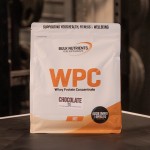Why Eggs Are a Great Protein Source We Should Eat More Of

The quality of egg protein
Eggs are a great protein source not just because Rocky had them, but because they have a high level of protein digestibility, which indicates how much of a given protein our body absorbs.
Take a look at how eggs measure up here:
- Eggs: 97% digestibility
- Dairy: 97% digestibility
- Peanut butter: 95% digestibility
- Meat and Fish: 94% digestibility
But the other benefit to eggs is how slow they digest.
We know protein is the best macronutrient for satiety, but eggs particularly digest slowly, which keeps us fuller for longer.
And the fuller we feel, the more unlikely we are to eat again, which spells good news for our weight loss efforts.
The reason most people fail on their weight loss diets is that they don't feel full enough, and therefore overeat.
And the research that has examined the digestion speed of eggs (amongst other sources) is eye-opening:
- Cooked eggs: digest at 2.9 grams per hour
- Pea protein: digests at 3.5 grams per hour
- Milk protein: digests at 3.5 grams per hour
- Soy protein: digests at 3.9 grams per hour
- Casein isolate: digests at 6.1 grams per hour
- Whey isolate: digests at 8-10 grams per hour
- Pork tenderloin: digests at 10 grams per hour
At just 2.9 grams per hour, that's a nice slow speed for our eggs!
And back to our friend Rocky, he's not off the hook entirely...
Because despite being a fan of eggs, he drank them raw! But our bodies can't absorb raw eggs!

Whilst that film motivated the heck out of an entire generation, it certainly didn't set the standard for nutritional advice! Thus, a generation of gym-goers (me included for a while) took to raw eggs in their shake.
So don't make the same mistake; either cook your eggs or consume a whey protein concentrate shake instead.
How many eggs for optimal protein?
You might need more eggs than you think for optimal protein.
One whole egg contains:
Protein: 6.3 grams
Fat: 5.2 grams
Carbohydrates: 0.7 grams
Calories: 74
Meanwhile, one egg white contains:
Protein: ~4 grams
Fat: <0.1 grams
Carbohydrates: 0.2 grams
Calories: 17
Personally, I find 2-3 whole eggs and 3-4 whites in the form of an omelette is a great meal that isn't too high in fat, and that packs a lot of protein. Couple that with some spinach for fibre, and you're set to go.
With that meal (spinach aside) you'll finish up with ~30 grams of protein and around 11 grams of fat.
Plus, we know it will digest slowly (great for satiety and fat loss) and we know the quality of the egg protein will be great for muscle development!
The health benefits of eggs
But eggs go further than just helping us grow muscle and lose weight; they're also packed with vitamins and minerals like few foods are!
Eggs are the lowest-cost animal source for proteins, iron, vitamin A, vitamin B12, riboflavin, choline, and the second-lowest source for zinc and calcium.
And it's the yolk where all the goodies are found; can you believe that egg yolks contain ALL vitamins except for vitamin C?!
Eggs are also rich in phosphorus, calcium, potassium, and contain only a moderate amount of sodium.
Moreover, eggs also contain all essential trace elements such as copper, magnesium, iron, selenium, and zinc (the iron and zinc are derived from the yolk).

And this is one of the ways eggs are a great health food: a deficiency in zinc, magnesium and selenium has been associated with depression and fatigue, and the development of pathological diseases.
And all the aforementioned vitamins are important for our health, as they help bolster your immune system, heal wounds, support your bones, convert food into energy, and repair cellular damage.
The bottom line is that eggs are a great cost-effective food that supports muscle growth and fat loss together with optimal health. They have a very high protein digestibility score and digest slowly; both of which support body composition effectively.
The best way to consume eggs is by cooking them, as raw eggs won't absorb properly! Four eggs contain 24 grams of protein, or six egg whites yield the same amount. Moreover, eggs contain all vitamins except vitamin C, and all essential trace elements (copper, magnesium, iron, selenium, and zinc). All are important for our general health.

Dayne Hudson
Like many, Dayne was once desperate to lose weight and get into shape. But everyone he asked, everything he read, lead to the same place... nowhere.
His journey started there - researching science journals and completing a Sports Nutrition Specialist qualification so he could make weight loss easier.
References:
- Drewnowski A. The Nutrient Rich Foods Index helps to identify healthy, affordable foods. Am. J. Clin. Nutr. 2010;91:1095s–1101s. doi: 10.3945/ajcn.2010.28450D.
- Evenepoel P, Geypens B, Luypaerts A, Hiele M, Ghoos Y, Rutgeerts P. Digestibility of cooked and raw egg protein in humans as assessed by stable isotope techniques. J Nutr. 1998 Oct;128(10):1716-22. doi: 10.1093/jn/128.10.1716. PMID: 9772141.
- Hosomi K, Kunisawa J. The Specific Roles of Vitamins in the Regulation of Immunosurveillance and Maintenance of Immunologic Homeostasis in the Gut. Immune Netw. 2017;17(1):13-19. doi:10.4110/in.2017.17.1.13
- National Research Council (US) Subcommittee on the Tenth Edition of the Recommended Dietary Allowances. Recommended Dietary Allowances: 10th Edition. Washington (DC): National Academies Press (US); 1989. Available from: https://www.ncbi.nlm.nih.gov/books/NBK234932/ doi: 10.17226/1349
- Paddon-Jones D, Westman E, Mattes RD, Wolfe RR, Astrup A, Westerterp-Plantenga M. Protein, weight management, and satiety. Am J Clin Nutr. 2008 May;87(5):1558S-1561S. doi: 10.1093/ajcn/87.5.1558S. PMID: 18469287.
- Réhault-Godbert S, Guyot N, Nys Y. The Golden Egg: Nutritional Value, Bioactivities, and Emerging Benefits for Human Health. Nutrients. 2019;11(3):684. Published 2019 Mar 22. doi:10.3390/nu11030684
- Schaafsma G. The protein digestibility-corrected amino acid score. J Nutr. 2000 Jul;130(7):1865S-7S. doi: 10.1093/jn/130.7.1865S. PMID: 10867064.
- Wang J., Um P., Dickerman B.A., Liu J. Zinc, Magnesium, Selenium and Depression: A Review of the Evidence, Potential Mechanisms and Implications. Nutrients. 2018;10:584. doi: 10.3390/nu10050584.





























